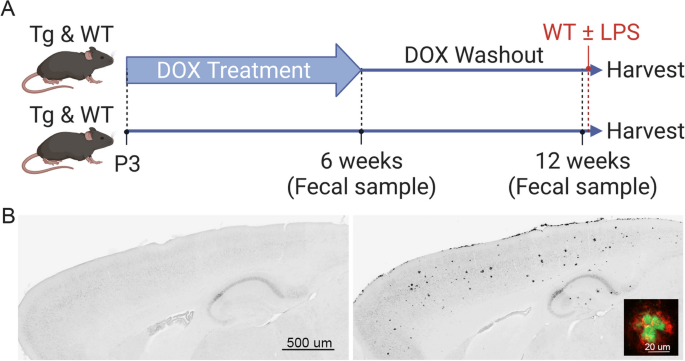💡 This study aimed to investigate the impact of doxycycline, commonly used for transgene control in tetracycline transactivator (tTA) systems, on the gut microbiome and subsequent neuroimmune responses in a mouse model of Alzheimer’s disease.
📍 Methods:
📌 Doxycycline Effects on Microbiome Diversity: Doxycycline administration led to a decrease in gut microbiome diversity in both transgenic (Tg) and wild-type (WT) mice. Changes in microbiome composition persisted long after doxycycline withdrawal. Even low doses of doxycycline disrupted various measures of gut microbiome stability.
📌 Persistence of Microbiome Alterations: Six weeks post-doxycycline withdrawal, the gut microbiome still exhibited hallmarks of prior doxycycline exposure. While some features recovered, such as bacterial community evenness, bacterial richness remained low in both genotypes.
📌 Neuroimmune Responses and LPS Challenge: Despite persistent alterations in the gut microbiome, doxycycline treatment had minimal effect on basal transcriptional signatures of inflammation in the brain. The neuroimmune response to acute lipopolysaccharide (LPS) challenge remained robust in both doxycycline-treated and untreated mice. No overt effect of LPS on gross glial morphology was observed.
📌 Comparison with Antibiotic Cocktails: Findings contrasted with studies using high-dose antibiotic cocktails for experimental microbiome disruption, which affected immune responses in the brain. Doxycycline-induced changes in the gut microbiome had less impact on neuroimmune responses than antibiotic cocktails used for microbiome disruption.
📌 APP Overexpression and Gut Microbiome: Transgenic mice overexpressing amyloid precursor protein (APP) showed age-dependent differences in gut microbiome properties. Gut microbiome alterations in APP transgenic mice coincided with or preceded the expected onset of amyloid pathology in the brain.
📌 Sex and Genotype Interaction: No significant differences in microbiome properties between male and female mice of either genotype were observed.
Past work suggests potential interactions between sex and genotype in shaping gut–brain communication in amyloid models.
📍 The study revealed that doxycycline, used for transgene control in tTA-based models of neurological disease, caused persistent disruptions in the gut microbiome. However, these changes did not overtly dampen the neuroimmune responses, assuaging concerns that doxycycline treatment might introduce unwanted artifacts in studies of transgenic models of neurodegenerative diseases. The findings emphasize the potential use and limitations of controllable transgenic models in neuroinflammatory research.
Link to the article : http://tinyurl.com/4e9wpb3w
